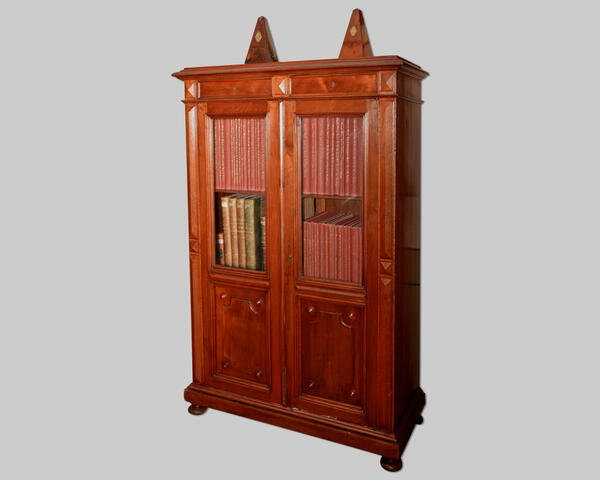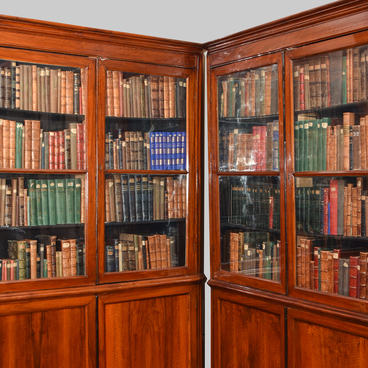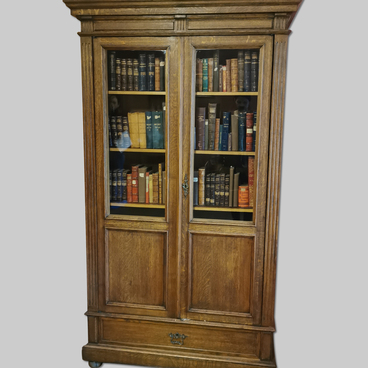Pyotr Tchaikovsky’s music cabinet stores music scores for Mikhail Glinka’s operas, a collection of Orthodox chants — Octoechos, and a full collection of Mozart’s works published by the world’s oldest music publishing house, Breithopf& Härtel.
Mozart and Glinka were Tchaikovsky’s favorite composers ever since he was a child. The future composer first heard parts of Mozart’s works in his home in Votkinsk: the family had an orchestrion — a mechanical piano with musical pieces recorded on its cylinders. As an adult, Tchaikovsky attended a staging of the opera Don Giovanni in St. Petersburg, which made a big impression on the composer.
On several occasions, Tchaikovsky wrote that the reason he devoted his life to music and loved it more than anything else was Mozart’s music. Tchaikovsky made a lot of notes on the pages with works of his beloved composer; those notes conveyed his attitude to music, served as tips for his performances as a conductor, or sketches for his own works.
Tchaikovsky received a full collection of Mozart’s works as a Christmas gift from his publisher Pyotr JurgensOn. The composer and the publisher were colleagues and good friends. Jurgenson asked Tchaikovsky’s servant, Alexey Sofronov, to put the gift under the Christmas tree. That’s where the composer found it. He was absolutely thrilled with the present and later wrote to the publisher: ‘Next to the Christmas tree, I discovered my god, my idol, my ideal, represented by all of his divine works. I was happy as a child!!! Thank you, thank you, thank you!!! ’
As for Glinka, Tchaikovsky considered him the ideal of Russian music, and said: ‘All of Russian music developed from Glinka, like a oak develops from an acorn’. Tchaikovsky first heard Glinka’s opera A Life for the Tsar as a teenager, in St. Petersburg. It became one of his favorite pieces ever since. Tchaikovsky said: “Glinka created authentically Russian operas and established an entirely new music tradition or at least a movement, to which I personally belong, as a continuation of Glinka”.
Tchaikovsky used Octoechos for harmonizing his All-Night Vigil and for composing other religious pieces.
Mozart and Glinka were Tchaikovsky’s favorite composers ever since he was a child. The future composer first heard parts of Mozart’s works in his home in Votkinsk: the family had an orchestrion — a mechanical piano with musical pieces recorded on its cylinders. As an adult, Tchaikovsky attended a staging of the opera Don Giovanni in St. Petersburg, which made a big impression on the composer.
On several occasions, Tchaikovsky wrote that the reason he devoted his life to music and loved it more than anything else was Mozart’s music. Tchaikovsky made a lot of notes on the pages with works of his beloved composer; those notes conveyed his attitude to music, served as tips for his performances as a conductor, or sketches for his own works.
Tchaikovsky received a full collection of Mozart’s works as a Christmas gift from his publisher Pyotr JurgensOn. The composer and the publisher were colleagues and good friends. Jurgenson asked Tchaikovsky’s servant, Alexey Sofronov, to put the gift under the Christmas tree. That’s where the composer found it. He was absolutely thrilled with the present and later wrote to the publisher: ‘Next to the Christmas tree, I discovered my god, my idol, my ideal, represented by all of his divine works. I was happy as a child!!! Thank you, thank you, thank you!!! ’
As for Glinka, Tchaikovsky considered him the ideal of Russian music, and said: ‘All of Russian music developed from Glinka, like a oak develops from an acorn’. Tchaikovsky first heard Glinka’s opera A Life for the Tsar as a teenager, in St. Petersburg. It became one of his favorite pieces ever since. Tchaikovsky said: “Glinka created authentically Russian operas and established an entirely new music tradition or at least a movement, to which I personally belong, as a continuation of Glinka”.
Tchaikovsky used Octoechos for harmonizing his All-Night Vigil and for composing other religious pieces.



